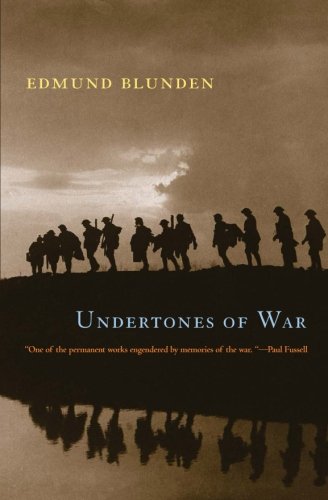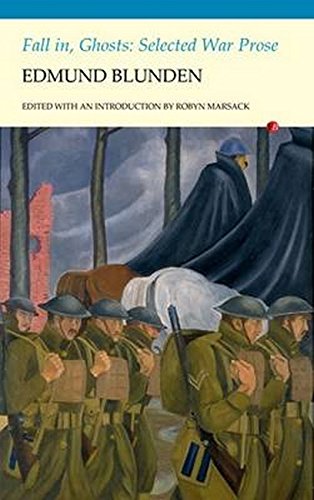Background
He was born on November 1, 1896, in London, England. Blunden was the eldest of the nine children of Charles Edmund Blunden and his wife, Georgina Margaret née Tyler, who were joint-headteachers of Yalding school.



( I took my road with no little pride of fear; one morni...)
I took my road with no little pride of fear; one morning I feared very sharply, as I saw what looked like a rising shroud over a wooden cross in the clustering mist. Horror! But on a closer study I realized that the apparition was only a flannel gas helmet. . . . What an age since 1914! In Undertones of War, one of the finest autobiographies to come out of World War I, the acclaimed poet Edmund Blunden records his devastating experiences in combat. After enlisting at the age of twenty, he took part in the disastrous battles at the Somme, Ypres, and Passchendaele, describing them as murder, not only to the troops but to their singing faiths and hopes. All the horrors of trench warfare, all the absurdity and feeble attempts to make sense of the fighting, all the strangeness of observing war as a writerof being simultaneously soldier and poetpervade Blundens memoir. In steely-eyed prose as richly allusive as any poetry, he tells of the endurance and despair found among the men of his battalion, including the harrowing acts of bravery that won him the Military Cross. Now back in print for American readers, the volume includes a selection of Blundens war poems that unflinchingly juxtapose death in the trenches with the beauty of Flanderss fields. Undertones of War deserves a place on anyones bookshelf between Siegfried Sassoons poetry and Robert Gravess Goodbye to All That.
http://www.amazon.com/gp/product/0226061760/?tag=2022091-20

(Edmund Blunden (1896 - 1974) moved among the ghosts of th...)
Edmund Blunden (1896 - 1974) moved among the ghosts of the Great War every day of his long life, having survived the battles of Ypres and the Somme. His classic prose memoir, Undertones of War, and his early edition of Wilfred Owen's poems were just two examples of the ways in which he sought to convey his war experience, and to keep faith with his comrades in arms. His poetry is suffused by this experience, and he was haunted by it throughout his writing life, as the men with whom he had served gradually joined the ranks of the departed. This selection of Blunden's prose about the First World War includes the complete text of De bello germanico, his first, lively sketch of the war as he lived it in 1916. Deeply informed by his reading of eighteenth- and nineteenth-century literature, and equally by his knowledge of the countryside, Blunden's vivid prose summons up for us what was human and natural in that most unnatural of environments, the battlefields of the Western Front.
http://www.amazon.com/gp/product/1847772110/?tag=2022091-20
He was born on November 1, 1896, in London, England. Blunden was the eldest of the nine children of Charles Edmund Blunden and his wife, Georgina Margaret née Tyler, who were joint-headteachers of Yalding school.
Blunden was educated at Christ's Hospital and The Queen's College, Oxford.
After graduating from Christ's Hospital and Oxford and winning the Military Cross in World War I, he was professor of English literature at Tokyo University (1924 - 1927) and subsequently an Oxford fellow and tutor for twelve years. He had won the Hawthornden Prize in 1922 for The Shepherd, and his Undertones of War (1929) brought him still wider attention. Blunden's miscellaneous prose has much charm, and his early dialectal and bucolic verse in Poems 1914-1930 received critical acclaim. His later verse, in Poems: 1930-1940 (1941), Shells by a Stream (1944), and After the Bombing (1948), which largely eschews dialectal treatment, has a contemplative dignity. He also wrote biographies of Leigh Hunt (1930), Thomas Hardy (1942), and Shelley (1946). Other volumes of verse include A Hong Kong House (1962) and Eleven Poems (1966). Blunden taught English at Hong Kong University from 1953 to 1964 and held the Oxford University Chair for Poetry from 1966 to 1968. He received the Queen's Gold Medal for Poetry in 1956 and in 1963 was made a member of Japan's Order of the Rising Sun. He died near Sudbury, Suffolk, January 20, 197
( I took my road with no little pride of fear; one morni...)
(Edmund Blunden (1896 - 1974) moved among the ghosts of th...)
Blunden was married three times. While still in the army, he met and married Mary Daines in 1918. They had three children, the first of whom died in infancy. They divorced in 1931, and in 1933, Blunden married Sylva Norman, a young novelist and critic. That marriage, which was childless, was dissolved in 1945. The same year, he married Claire Margaret Poynting (1918–2000), one of his former pupils; they had four daughters. While in Japan in the summer of 1925, he met Aki Hayashi, and he began a relationship. When Blunden returned to England in 1927, Aki accompanied him and would become his secretary. The relationship later changed from a romantic one to a platonic friendship, and they remained in contact for the rest of her life.
